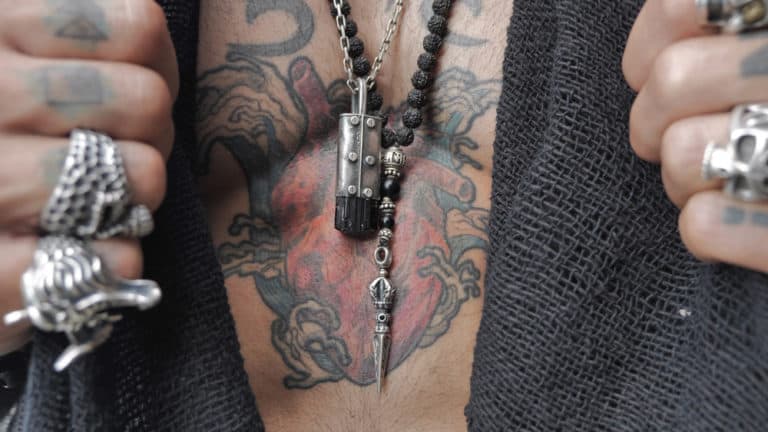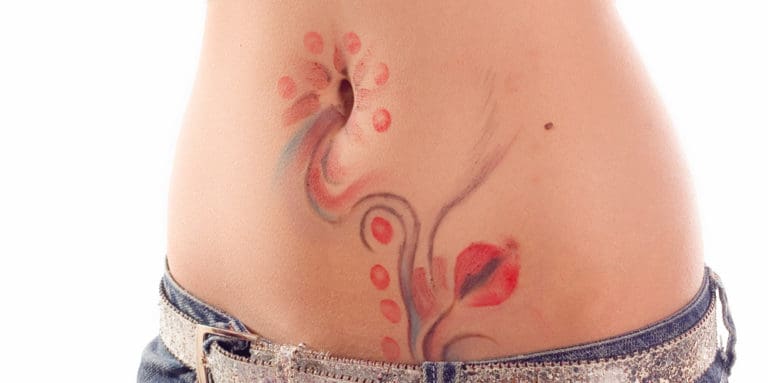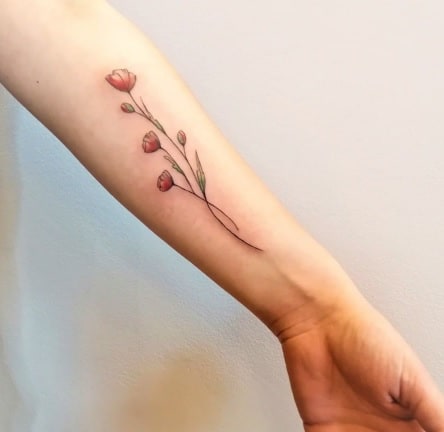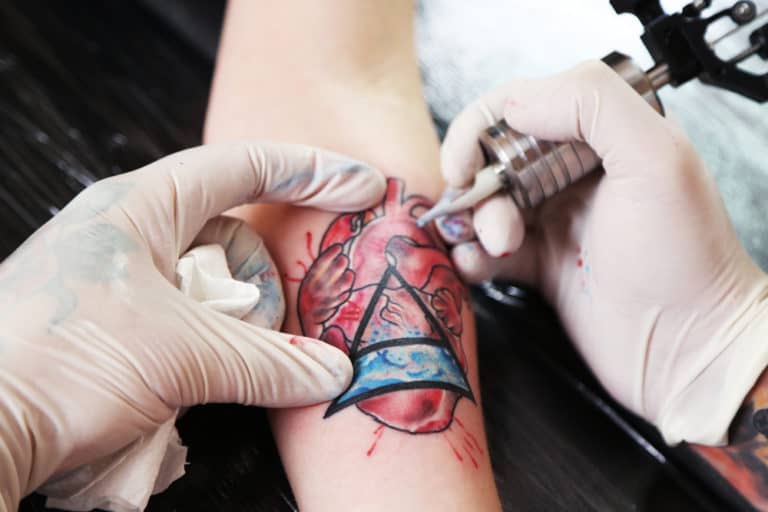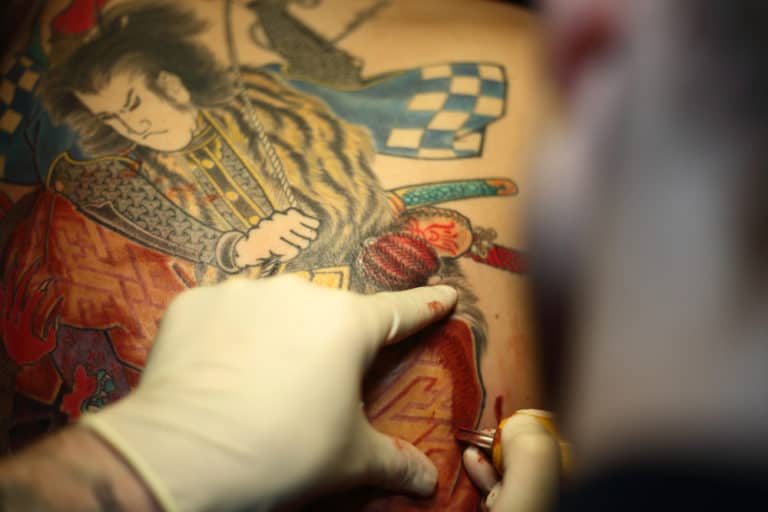Can You Get A Tattoo While Trying To Conceive?
If you’re planning a family and planning a tattoo, should the two coincide? Plenty of urban legends whisper about tattoos causing infertility, miscarriage, or birth differences in your baby. Let’s separate the myths from the truth. Can you get a tattoo while trying to conceive?
Getting a tattoo while trying to conceive (TTC) will not affect your fertility unless you get an infection, have an allergy, or absorb toxic ink. Another potential risks of tattoos while TTC is that your changing body could distort the tattoo, and your pain and stress levels may be more acute.
There is very little research on tattoos’ impact on conception and pregnancy. The chances are that you will be completely safe getting inked. Still, many doctors suggest avoiding tattoos as a possible high-risk activity (along with smoking, drinking, and eating soft cheese) and that you should rather wait until after your baby’s birth to get that celebratory body art.
Can You Get A Tattoo While Trying To Conceive?
Because so few scientific and medical studies on women and tattooing exist, there is no medical law on tattoo safety, saying you can’t or shouldn’t get tattooed while trying to conceive (TTC).
Still, common myths continue to fly around. One legend suggests that getting a tattoo reduces your ability to conceive, while another says you won’t carry a baby to full-term or have a stillbirth. Many women say that a back tattoo means you’ll never have an epidural or suffer intense pain during inking.
These myths are untrue: unless you are one of a tiny minority who gets an infection during or after the procedure, a tattoo will have no impact on your fertility and reproductive system.
Because of the improbable but possible risks associated with having a tattoo while TTC, pregnant, and breastfeeding, most doctors and many tattoo artists will advise you to wait until after giving birth. Let’s look at these risks to help you make a decision.
Tattoo Risks: Infection
The main risk of having a tattoo while TTC or when pregnant is that you can get a viral or bacterial infection. Few people get an infection from a tattoo, but you are still taking a risk. (Existing statistics range from a 0.5% to 6% infection rate, depending on where you have the tattoo.)
Infections are dangerous because they impact your immune system, which is a problem if you have an existing condition (like diabetes) and you’re TTC. Getting further infections while immune-compromised can affect your fertility and lead to life-long disease.
Pregnant women are already immune-compromised, as the growing baby needs white blood cells, so they are at particular risk, let alone the developing baby. Breastfeeding moms are also vulnerable.
The Risk Of Blood-borne Infections
The most severe infections you may get from tattoos are blood-borne diseases, including hepatitis B, hepatitis C, and HIV, which are carried via contaminated needles.
These serious diseases will impact both your immune system and other organs of the body, making it less likely that you conceive.
If you do become pregnant, you can pass the infection to your baby at birth because these diseases are blood-borne.
Hepatitis B can be fatal, and babies born with hepatitis B have a 90% chance of developing a chronic liver infection. Mothers with hepatitis C have a 6% chance of passing the disease to the baby. HIV is a life-threatening virus from which babies can develop full-blown AIDS, and babies have a 45% possibility of catching the virus from the mother.
The Risk Of Bacterial Infections
Other infections can be bacterial rather than viral and are associated with the skin around the tattoo becoming infected.
When you suffer from a low immune system, a superficial skin infection can develop aggressively, with the tattoo becoming inflamed and pustulent, resulting in fever, chills, and tremors. Untreated infections can enter the blood, leading to sepsis, which is often fatal.
Another resulting disease is cellulitis, a bacterial infection of the inner layers of the skin. If not treated promptly, cellulitis can be life-threatening.
The challenge with treating bacterial infections when TTC or pregnant is that you need to take antibiotics. Doctors disagree on whether antibiotics are safe during pregnancy and breastfeeding, as they can possibly harm the baby.
Tattoo Risks: Toxic Ink
A second reason women are advised not to get inked while TTC or pregnant is that your body can react to the ink, either because it is toxic or because you have developed an allergy.
The Risk Of Contaminated Ink
Cheap, poor-quality tattoo inks can be toxic to both mother and baby.
Even though the ink only penetrates 1/8 inch into the skin, you are still exposed to possible toxins. Research shows that the ink may be transported via your lymph system and through the placenta.
Ink-borne toxins include mercury, arsenic, and lead. Heavy metal poisoning is dangerous to the growing fetus, especially during the first trimester when the major organs, including the brain, develop. Toxins can also cause cancer, miscarriage, and stillbirth.
However, there have been no cases of toxic ink causing a pregnant woman to miscarry or give birth to a baby with birth differences.
Unfortunately, the quality of tattoo ink is poorly regulated, as it is regarded as a cosmetic product. Lobbies to categorize tattoo ink as a food product, with tighter guidelines, are underway in the US and Europe.
The Risk Of Ink Allergy
Even if the ink is not contaminated, there is a chance your body will react to it if you have an allergy to one of the ink’s ingredients.
Allergic reactions to ink usually appear around the site of the tattoo, such as inflammation, swelling, pain, and suppuration. Because these reactions look like an infection, it is imperative to go to a doctor or other medical professional immediately to get the appropriate treatment.
Most skin allergies are treated with corticosteroids. Unfortunately, women who are TTC, pregnant, or breastfeeding should not use corticosteroids.
Tattoo Risks: Body Changes
Another risk of having a tattoo while trying to conceive is that your body changes radically during pregnancy and after birth, so your tattoo may not look the same afterward.
The biggest challenge is your skin stretching on the belly, thighs, buttocks, and arms. Many pregnant women struggle with swollen feet as well. You can be left with stretch marks which may mar the tattoo.
Your body can also change shape. The tattoo you had on lovely smooth, firm skin may look distorted in a year, especially if it is placed where your body expands to accommodate the growing baby.
Another skin change during pregnancy or if you’re on hormones is melasma, a temporary darkening of the skin. This condition can impact how your tattoo looks.
Furthermore, many women report that their skin is susceptible to pain when on hormones, pregnant, or after birth. Being inked at this time can be particularly painful.
Tattoo Risks: No Epidural
A common myth about tattoos for pregnant women is that a lower back tattoo means a doctor won’t give you an epidural or spinal anesthetic.
If you had your lower back tattoo years before the birth, or if you had a recent one that has healed completely, there is no risk – you can have an epidural safely.
However, if the tattoo is freshly inked, infected, leaking fluid, inflamed, or you’re having an allergic reaction on the site, the anesthetist will avoid giving you an epidural as the risk of complications is high.
Discuss the question of a possible epidural with your doctor if you have a lower back tattoo or are planning to get one.
Tattoo Risks: Stress
Getting inked, especially for the first time, can be stressful, which is not healthy for women who are TTC and definitely bad for pregnant women.
If you know you struggle with stress and anxiety, and if they impact you physically (such as fainting, hyperventilating, shaking, or panic attacks), avoid having a tattoo until after the birth.
It is possible to go into early labor because of anxiety, but it is improbable that the stress of a tattoo procedure will be intense enough to cause it. Still, many tattoo artists avoid tattooing pregnant women for this reason.
What If You Got A Tattoo Without Knowing You’re Pregnant?
If you have been TTC and found out you’re pregnant after having a tattoo (congratulations on both!), your first step is to see your doctor, discuss any concerns, and get tested for possible infections if you’re worried.
Assuming you went to a reputable studio with a qualified artist and were tattooed under sanitary conditions, you should not have any problems.
However, you may take a little longer to heal when pregnant, and your skin may be more sensitive than usual. Expect discomfort and inflammation for the first few days as your body responds to the wound with swelling and some plasma seeping.
Take special care of the tattoo wound to ensure that there is no infection and that it will heal quickly. Follow your artist’s guidelines for aftercare, which should be as follows:
- Wash the tattoo carefully twice daily with antibacterial or tattoo foam soap, then pat dry and apply hydrating lotion. Most tattoo lotions and ointments help with irritation and itchiness as well.
- Wash your hands before touching your tattoo.
- Never scratch the scab or remove flaky skin, even if the tattoo is itchy. Fiddling with the tattoo can cause bleeding, scabbing, scarring, and even infection, as there may be bacteria under your nails.
- Do not cover the tattoo with thick ointment, sticking plasters, or bandages. It needs to breathe to heal.
- Avoid wearing tight clothing that may cause friction and delay healing.
- Try not to go swimming or have a bath. Take a quick shower instead. If the tattoo does get wet, dry it by blotting it with a towel.
- Avoid sunlight on the tattoo. Try to keep the tattoo in the shade or wear protective clothing. If you must go in the sun, cover the tattoo with sunscreen.
- Hydration is vital to keep your tattoo healthy. Keep applying tattoo lotion and butter regularly.
Getting A Tattoo While Trying To Conceive Or When Pregnant
If you decide to get inked, follow these guidelines to keep yourself and (potential) junior as safe as possible.
- Do your research to find a licensed, reputable tattoo parlor with highly qualified artists. Get reviews and recommendations from trustworthy sources.
- Check that the studio follows all regulations regarding tattoo shops, both local and state laws.
- Visit the studio beforehand to check that the artists work with sterile needles and dressings, fresh gloves, and ink-free of heavy metals. Single-use tubs of vegetable dye pigments are ideal.
- See that the studio has an autoclave and an electronic sterilizer for cosmetic and medical equipment.
- Ensure the environment is hygienic, with a clean floor, disinfected chairs and surfaces, and emptied garbage bins.
- Discuss your tattoo plans with the artist, making it clear that you are TTC or pregnant. Some artists prefer not to work on pregnant women because of the potential risks; others will ask you to sign a waiver; the best ones will be available to you for the next day or so after the session in case you have any challenges or questions.
- Your skin can be more sensitive than usual if you are on hormone therapy or pregnant. The tattoo procedure may be particularly painful.
- Avoid getting a tattoo on your stomach, hips, and thighs, as these areas stretch the most during pregnancy. The stretched skin can distort your tattoo.
- Ensure that you follow the recommended aftercare regimen, keeping the tattoo clean to avoid infection and other complications.
Conclusion
Having a tattoo while trying to conceive should be safe. However, doctors warn against tattoos during pregnancy, citing the risks of infection, toxic ink, and stress, which can impact both mother and baby. Your body may also change during pregnancy and birth. Most doctors and tattoo artists advise waiting until you are finished breastfeeding before having a tattoo.
Some of my favorite designs, tattoo books, and aftercare products, selected for you
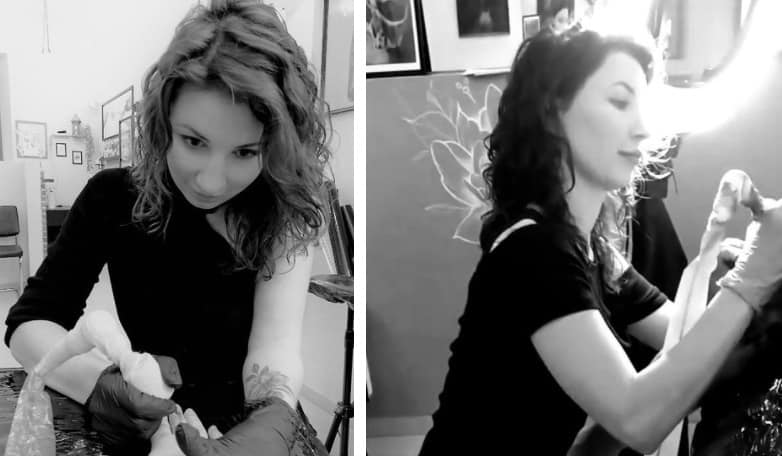
Thank you for reading my article, I hope that you have found it helpful. If you would have trouble finding ideas for your tattoo, wonder what is meaning of design that you have found or what to buy for aftercare, to make sure that your tattoo will be healing quickly and easily, here are some of my favorite products in one place, hope that this will also help.
Design and tattoo ideas
For some ideas you can have a look at those 3 books with hundreds of designs that I use with my clients, they are available on Amazon for Kindle or in classic, paper version (links below):
- Great Book of Tattoo Designs, Revised Edition: More than 500 Body Art Designs (Fox Chapel Publishing) Fantasy, Celtic, Floral, Wildlife, and Symbol Designs for the Skin by Lora Irish
- The Big Book of Small Tattoos – Vol.1: 400 small original tattoos for women and men by Roberto Gemori
- Tiny Tattoos: Over 1,000 Small Inspirational Artworks by Rebecca Vincent.
Tattoo meaning
If you would like to read more about the meaning of different tattoo styles and designs before you will decide what you would like to have, I can recommend a book that was really useful for me when I was starting my tattoo adventure – it’s “Conscious Ink: The Hidden Meaning of Tattoos” by Lisa Barretta (through the link you can find it on Amazon for around $10).
Tattoo aftercare
The skin at the tattoo site often dries out. To prevent it and speed up healing for my clients, I usually recommend one of those tattoo aftercare balms (you can find them on Amazon):
Resources
- https://authoritytattoo.com/can-you-get-a-tattoo-while-pregnant/
- https://www.savedtattoo.com/can-getting-a-tattoo-cause-miscarriage/
- https://www.webmd.com/parenting/is-it-safe-to-get-a-tattoo-while-pregnant
- https://www.whattoexpect.com/pregnancy/tattoos
- https://www.yahoo.com/lifestyle/know-getting-tattoo-while-ttc-184955760.html


